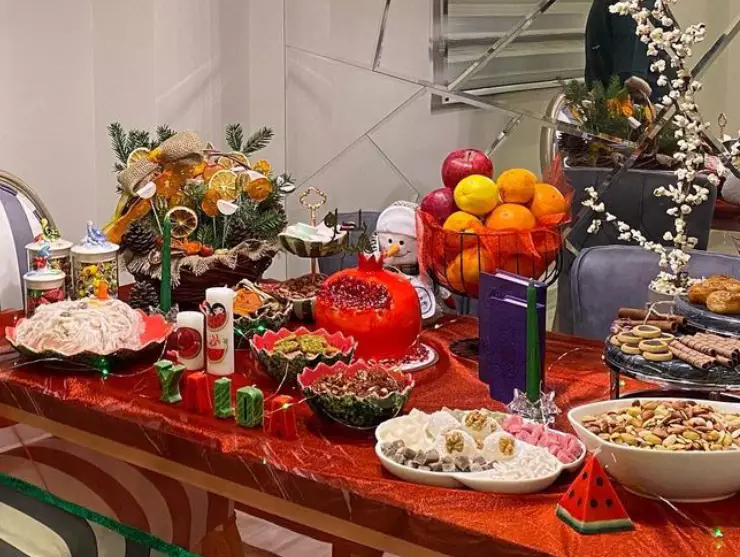Yalda Night, also known as Shab-e Yalda, is an ancient Persian celebration that takes place on the longest night of the year, which usually falls on December 21st. This time-honored tradition holds deep cultural and historical significance for Iranians and is celebrated with great enthusiasm and joy. Yalda Night is not only a celebration of the winter solstice but also a time for families and communities to come together, share stories and poetry, and enjoy traditional foods and drinks. Let’s delve into the rich traditions and symbolism surrounding Yalda Night and explore why it continues to be an important part of Persian culture today.

Yalda Night: An Ancient Persian Celebration
Yalda Night, meaning “birth”, is believed to have originated from the ancient Zoroastrian tradition in Persia. It is a time to celebrate the rebirth of the sun and the triumph of light over darkness. This celebration has been passed down through generations and remains an integral part of Persian culture. Iranians eagerly anticipate Yalda Night each year, as it is a festive occasion that brings families and friends together.
The Origins of Yalda: A Winter Solstice Tradition
Yalda Night has its roots in the ancient Persian religion of Zoroastrianism, which was prevalent in Persia before the arrival of Islam. Zoroastrians believed in the power of light and celebrated the winter solstice as the turning point when days would begin to lengthen again. With the advent of Islam in Persia, the celebration of Yalda Night merged with other cultural and religious practices, resulting in the unique blend of customs observed today.
Yalda Night: Celebrating the Longest Night of the Year
Yalda Night is a celebration of the winter solstice, which marks the longest night and the shortest day of the year. As the sun sets on this night, families gather together in their homes, illuminated by the warmth of love and joy. The occasion is filled with laughter, storytelling, and a deep appreciation for the natural cycles of the Earth.
Symbolism and Rituals of Yalda Night
Yalda Night is steeped in symbolism, with various rituals and customs observed throughout the evening. One of the most prominent symbols is the pomegranate, representing the cycle of life, fertility, and the rebirth of nature. Another ritual involves lighting candles or a bonfire, symbolizing the triumph of light over darkness. These rituals not only hold religious and spiritual significance but also create a sense of unity and connection among participants.
The Significance of Pomegranates on Yalda Night
Pomegranates hold great significance on Yalda Night. The vibrant red color of the fruit is reminiscent of the sun’s glow and the warmth it brings. Pomegranates are believed to bring good fortune and prosperity in the coming year. It is customary for families to gather around a bowl of pomegranates and share the fruit as a symbol of togetherness and renewal.
Yalda Night Feast: Traditional Foods and Drinks
No Yalda Night celebration is complete without a lavish feast. Traditional Persian foods such as Khoresh Gheimeh, a flavorful meat and split pea stew, and Baghali Polo, a fragrant rice dish with dill and fava beans, are commonly enjoyed. Fruits, nuts, and sweets like Halva and Gaz are also served. To accompany the feast, Iranians drink Aab-e Havij, a carrot-based drink, and Sekanjabin, a refreshing beverage made with vinegar and honey.
Sharing Stories and Poetry on Yalda Night
Yalda Night is a time for storytelling and poetry, a tradition that has been cherished for centuries. Families and friends gather together to share ancient tales, folklores, and poems passed down through generations. This tradition not only entertains but also educates, preserving the cultural heritage and wisdom of the Persian people.
Yalda Night and the Power of Good over Evil
Yalda Night symbolizes the victory of good over evil, light over darkness. It is believed that on this night, the forces of evil are at their peak, and by coming together, sharing joy and love, people can overcome these negative energies. Yalda Night serves as a reminder of the power of unity and the importance of staying connected with loved ones during challenging times.
Customs and Traditions during Yalda Night
Yalda Night is celebrated with various customs and traditions. Aside from the shared feast, families often engage in activities such as playing traditional games, singing traditional songs, and even dancing. Some may also participate in acts of charity and generosity, taking the opportunity to help those in need during this special time.
Yalda Night: Bringing Families and Communities Together
Yalda Night is a time for families and communities to come together and strengthen their bonds. It provides an opportunity for relatives who may be scattered across the country or even the world to reunite and celebrate their shared heritage. The sense of togetherness and belonging that Yalda Night fosters is a testament to the enduring power of tradition and culture.
Yalda Night, with its rich traditions and deep symbolism, continues to be an integral part of Persian culture. It serves as a reminder of the ancient wisdom and customs that have been passed down through generations. This celebration not only honors the winter solstice but also brings families and communities together, fostering unity, love, and generosity. As Yalda Night is celebrated year after year, the legacy of this ancient Persian tradition lives on, preserving the cultural heritage of Iran and inspiring generations to come.
